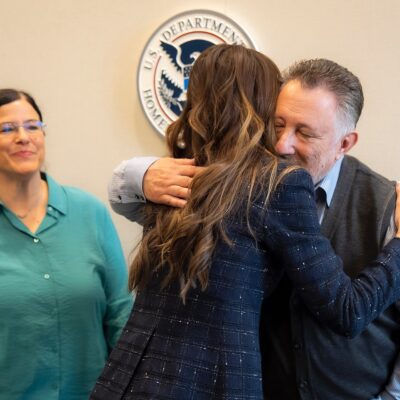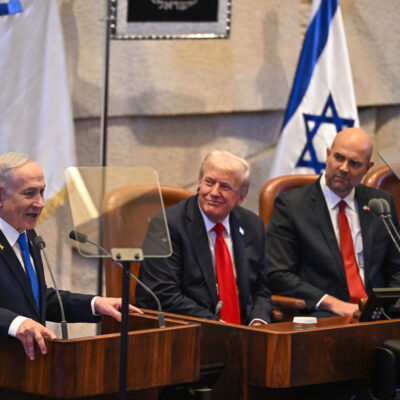
Courtesy
Meet the man who wants to be Arizona’s first Jewish governor
Aaron Lieberman is ‘putting his kippah into the ring’ in a bid for the state's top office
Aaron Lieberman, an Arizona state representative who flipped a Republican-held district in 2018, is hoping he can defy expectations once again as he embarks on a newly launched bid for statewide office. The former entrepreneur, a resident of northeast Phoenix, announced his candidacy in Arizona’s open-seat gubernatorial election earlier this summer, joining a growing number of Democratic primary contenders vying to replace outgoing Republican Gov. Doug Ducey, who is term-limited.
If Lieberman prevails, he would take up where Arizona’s last Democratic governor, Janet Napolitano — who resigned in 2009 to serve as secretary of homeland security in the Obama administration — left off. But the two-term legislator also wants to make history of another sort. “I’m running to be the governor of Arizona for all of our citizens, but I will also be the first Jewish governor of Arizona,” Lieberman, 49, proclaimed in a recent interview with Jewish Insider. “That means something to Jewish people.”
“He understands that his values as a political leader happen to be beautifully aligned with the roots of Jewish tradition, not the least of which is about justice and equality and education for all,” Rabbi John Linder of Temple Solel, a Reform synagogue in Paradise Valley, where Lieberman is a congregant, told JI. “I’m glad that he’s putting his kippah into the ring.”
Casting himself as a moderate lawmaker with a record of bipartisan cooperation, Lieberman argues that his campaign will appeal more broadly to voters who are eager for a return to “common-sense solutions” as Democrats and Republicans remain fiercely divided over false allegations of electoral fraud following last year’s presidential election.
Such tensions are unlikely to dissipate anytime soon as the company hired by Republican state senators to conduct an audit of the 2.1 million general-election ballots cast in Maricopa County prepares to release its results. The partisan review, which has been criticized as flawed by elections experts on both sides of the aisle, had been expected to publicize its findings on Monday, but the company, Cyber Ninjas, postponed submitting a full report due to a staff-wide COVID-19 outbreak, Senate President Karen Fann announced yesterday.
“I fundamentally believe — and I think a lot of people believe this right now — that our politics are broken and that our leaders aren’t stepping up to the challenge,” Lieberman said. “If you just go back and look at what we’ve all been through with COVID-19 — the hope and, I think, the belief was that we should be coming together, but instead it feels like we’re coming apart.”
While the Republican Party has occupied the Arizona governor’s office for more than a decade, Lieberman suspects the GOP’s reign will soon expire in the increasingly competitive battleground state, which handed President Joe Biden 11 electoral votes and is now overseen by two Democratic senators for the first time in nearly 70 years.
“The percentages of what I had to do to win in my statehouse district are exactly what you have to do to win statewide,” Lieberman argued. “You’ve got to win two out of three independents, you’ve got to get about 15% of Republicans to vote for you, and to do that you have to present as a problem-solver who’s focused on getting things done.”
“Honestly, moving back to Arizona, I was so disappointed by the nasty nature of our politics,” Lieberman said. “It was so different than the Arizona that I grew up in when our Democrats and Republicans actually worked together for the good of the state.”
With the primaries just under a year away, Lieberman is in for an arduous primary battle as he goes up against two Democrats who have already declared — Katie Hobbs, the secretary of state, and Marco López, the former mayor of Nogales.
Hobbs, the only candidate to have previously won statewide office, has significantly raised her profile in recent months as she has clashed with Republicans over the 2020 election results. In June, her campaign announced that she had raised $1 million just a week after entering the race.
Lieberman told JI he had pulled in more than $250,000 in the first 24 hours of his campaign — no small sum. But he will still need to boost his name recognition throughout the state if he has any hope of emerging victorious in the August 2022 primary. Three political science professors in Arizona who were asked to assess his prospects — two in Tucson and one in Tempe — told JI they knew nothing about Lieberman’s campaign or had never heard of him.
Though polling is scarce, a recent survey conducted by OH Predictive Insights, a nonpartisan market research company in Phoenix, showed Hobbs with a 74% favorability rating among Arizona Democrats, leading Nogales and Lieberman by 20 points. “There’s still a lot of movement that can happen,” Mike Nobles, chief of research at OH Predictive Insights, told JI. “Lieberman is in a decent position. Hobbs is clearly the one to beat.”
“His name ID is actually not too bad,” Nobles said of Lieberman. “However, roughly half of the electorate here in Arizona haven’t really formed an opinion of him.”
On the GOP side, Kari Lake, a former TV anchor who has positioned herself as a faithful ally of former President Donald Trump, leads the pack at 60%, according to the poll, followed by former Rep. Matt Salmon (R-AZ) at 51% and Arizona State Treasurer Kimberly Yee at 49%.
It will be some time until the candidates’ prospects come more clearly into view as they are not required to disclose campaign contributions until the December 31 filing deadline.

Arizona Secretary of State Katie Hobbs addresses the members of Arizona’s Electoral College in Phoenix. (AP Photo/Ross D. Franklin)
In the meantime, Lieberman says he is focused on his ground game as he begins campaigning across the state, motivated by a belief that Arizona voters are largely more moderate than the current pitched political atmosphere would lead one to believe.
“Much more of the state is in the middle, and people actually want common-sense solutions that can be kind of implemented and put forward to help deal with the big problems that are facing the state,” said Lieberman, who advocates for increased public school funding, expanding access to universal healthcare and a more robust approach to curbing climate change with renewable energy resources such as electric vehicles. “Unfortunately, that’s not what we’ve been doing in the legislature.”
A similar observation influenced his first bid for office when he returned to the Copper State six years ago after decades as an executive in the business sector. Lieberman was born in Tempe, where his mother, who converted to Judaism from Mormonism, founded a Reform synagogue, Temple Emanuel. He was raised in Phoenix, studied at Yale University and went on to co-found Jumpstart, the national early education nonprofit, as well as Acelero Learning, which is affiliated with the Head Start program.
Lieberman moved back to Arizona in 2015 and worked as the CEO of Phoenix Spine & Joint, a surgery center in Phoenix, and then became a partner with a venture philanthropy organization called New Profit.
He was compelled to run soon after. “Honestly, moving back to Arizona, I was so disappointed by the nasty nature of our politics,” Lieberman said. “It was so different than the Arizona that I grew up in when our Democrats and Republicans actually worked together for the good of the state.”
“It’s hard to know what you pick up on as a kid, and nostalgia is a powerful force,” Lieberman acknowledged, but he believes that state has largely lost its way, particularly, he argues, as the GOP has become increasingly radicalized in recent years. “I really ran,” he said, “to try to bring the state kind of back to the middle where I think most of its people are.”
“There’s probably extremes on both sides that are focused on kind of their way or the highway,” Lieberman added. “But unfortunately, we haven’t been able to get to that divided government where you actually have to have a negotiation that brings all groups towards the middle, and that’s what will happen when I’m governor.”
Lieberman said his tenure in office attests to that impulse. “If it has made sense, I’ve worked with Republicans on a whole host of issues,” he told JI. “I’ve been able to get millions of dollars for professional development for our schools during distance learning so that teachers can help be more effective remote instructors. I got $50 million for preschool funds from the rescue plan dollars, $5 million for small business loans.”
Still, Lieberman recognizes that there are limits to bipartisanship. “I’ll veto additional tax cuts, I’ll veto any attacks on teachers, I’ll veto any limits on a woman’s right to make her own healthcare choices — and that’ll be that,” he said of his plans for the governorship. “On the flip side, I’ve spent three years in the legislature building relationships with legislators, and I’ll be able to work with reasonable legislators on both sides to craft a budget that more broadly reflects where Arizonans are.”
“He’s been definitely a great asset to the legislature, someone who’s willing to work across party lines to get things done for our communities,” Alma Hernandez, a state legislator in Tucson, said of Lieberman, whom she has endorsed for governor. Hernandez told JI that Lieberman proved essential as she shepherded a Holocaust education bill, recently signed into law, through the state legislature.
Adam Goodman, a board member with the Jewish Community Relations Council of Greater Phoenix who has known Lieberman for years, echoed that sentiment. “I don’t know if he was too modest to say it but he was kind of the unsung hero of that bill,” Goodman said.
“That was an interesting journey,” Lieberman recalled. “At one point, Republican leadership, who were supportive, wanted a Republican member to run it who isn’t Jewish, and I just said in the meeting, ‘Well, we’d need to do that if Hitler were successful and had killed all of the Jews, but fortunately, some of us survived and we’re sitting right here as members of the legislature and we can run this bill under our own name.’”
Lieberman said he had just attended back-to-school night for his eighth-grade son at his local public school, where teachers were “proudly talking about how they were going to spend two weeks studying the Holocaust” in a district-wide curriculum. “It made me feel so proud about that kind of impact I was able to have and what it will mean, not just for my kids but for all kids to really understand more about the Holocaust and other genocides.”
“As a Jewish person, I’ll always stand up for and believe in Israel, in terms of my day-to-day work as a legislator and even being governor,” Lieberman told JI. “Israel’s track record of producing entrepreneurs is just amazing, and we want those entrepreneurs to come and grow their businesses by launching them in Arizona.”
The gubernatorial hopeful said he has made a persistent effort to stand in solidarity with the Jewish community on any number of issues. He visited Israel two years ago on a delegation to open an Arizona trade office in Tel Aviv, and during his first year in office supported a bill combating efforts to boycott the Jewish state.
“As a Jewish person, I’ll always stand up for and believe in Israel, in terms of my day-to-day work as a legislator and even being governor,” Lieberman told JI. “Israel’s track record of producing entrepreneurs is just amazing, and we want those entrepreneurs to come and grow their businesses by launching them in Arizona.”
He is guided, he said, by a deep sense of connection with his faith, one that has only deepened since he was elected, when he began attending Friday night services at his local synagogue nearly every week. “I find it to be just about the best way to end the week and start a weekend,” he told JI. “There’s an important aspect of feeling grounded in that faith tradition that has really helped me in my public service.”
Similarly, Lieberman said his resolve has only been strengthened as he prepares for a long and potentially acrimonious campaign that he regards as one of the most consequential elections in the coming cycle. “The stakes are incredibly high as to who is Arizona’s next governor,” he said.
“The woman who is likely going to be my opponent in the general election believes the election was stolen and that Trump is the rightful president of the United States,” Lieberman said, referring to Lake. “I sure as heck don’t want her hand on the pen when we need to certify the presidential election, especially when Arizona’s electoral votes could literally be the difference between who wins and who loses.”
As for his own bid, Lieberman remains dedicated to connecting with “everybody and anybody who believes in this vision of an Arizona that works for everybody and an Arizona that will actually uphold our election laws,” he said. “That’s an important thing. As the next governor of Arizona, I will sign the certification of the 2024 election.”
Lieberman is aware of the more immediate challenges ahead as he enters the race with some disadvantages, but he emphasizes that he has beaten the odds before.
“I’m committed to making sure we have all the resources we’ll need to compete and win,” Lieberman told JI. “But I need help, and for sure, I hope it will be attractive to members of the Jewish community all across the country, about the idea of this Jew in Arizona running to both fight for our democracy and fight for our kids.”






